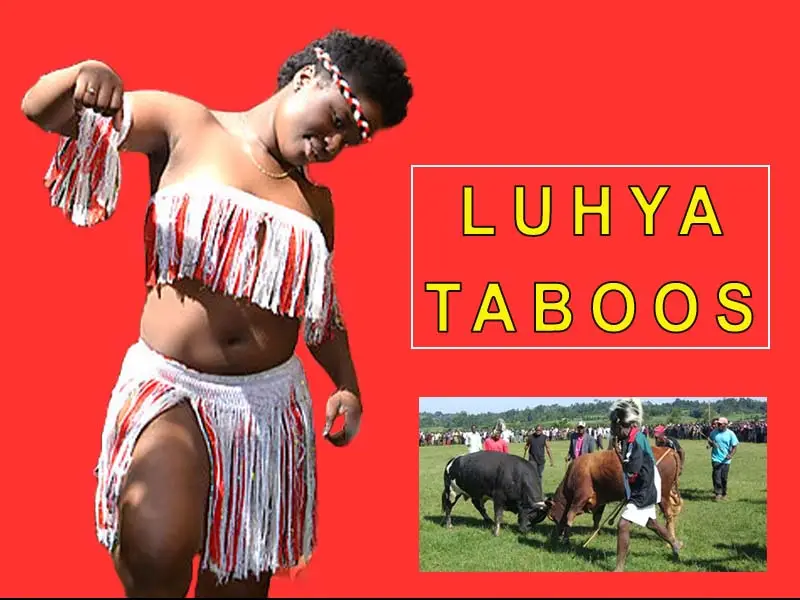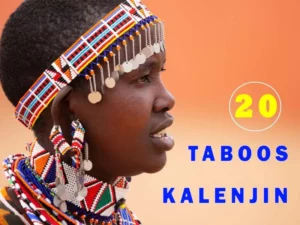The list of top 20 taboos in Luhya community is overwhelming for an ethnic group with at least 17 sub-tribes. A local population of 6.8 million relies on these unwavering traditions for religious purity and good relations.
A majority of Luhya customs and beliefs revolve around birth, circumcision, marriage, death, and food to name a few. While some rituals are meant to foster confidence others are all about keeping off evil spirits.
Top 20 Taboos in Luhya community
Civilization is yet to wash away critical aspects of culture in the Luhya community.
What are the beliefs of the Luhya community?
1. Luhya elders dying under hot sun
It is taboo for the elderly to die when the sun is up. A befitting death for the elderly is that occurring at the crack of dawn while not facing the outer walls of own house.
The community believes that if an aged person dies after sunrise, then they were not good enough. As a result, the possibility of them leaving curses in their families lingers.
To prevent the spirits from haunting the family, a cleansing ceremony is done before burial.
Age mates of the deceased must slaughter a cock and roast a ram to keep off evil spirits from the community.
2. It is taboo to eat forbidden foods
It is taboo for some categories of Luhya people to feast on specific foods.
For instance, it is taboo for children and women to eat some parts of a chicken. Similarly, women were only allowed to eat liver after giving birth. Only the backbones of a home are allowed to eat a chicken gizzard and liver.
What is Luhya traditional food? Omushenye is among the traditional foods of the Luhya comprising a mixture of boiled beans and boiled sweet potatoes. These include traditional vegetables such as Likhubi, Mitoo, Murere, and Lisutsa.
Coincidentally, food taboos among Luhya people touched on the most treasured delicacy in Luhyaland.
3. Eating fatty foods during circumcision
Circumcision is a crucial rite of passage during which fresh initiates were not allowed to eat fatty foods and energy drinks.
According to Luhyas, energy drinks and fatty foods slows the healing process because of hyperactivity.
4. Stumbling your feet on the way
Stumbling with the left foot while on a journey is taboo in the Maragori sub-tribe. On the other hand, if one stumble with both feet then double tragedy prevails.
The belief is different in the Wanga sub-tribe where stumbling with the left foot is a sign of luck and the right foot is a bad omen. The opposite is true when headed home.
5. Sweeping at night is taboo in Luhya community
Luhya people believe that sweeping at night is the equivalent of sweeping away blessings set to accompany one at dawn.
Also, Luhya people believed that visitors came with blessings. Sweeping immediately on their departure meant chasing the blessings, never to return.
Full list of taboos in Luhya community
Luhya myths are evident in various taboos which are still cherished by the tribesmen.
Enlisted are more outstanding beliefs and traditions;
- Women and children eating from the same plate as a man
- Cutting toenails and fingernails at night
- Sitting on cooking and milling stones
- Whistling at night or when it’s raining
- Eating while sleeping
- Licking the cooking stick and knives
- Spitting on one’s face
- Cutting the ground using an axe
- Two people colliding their jembes while working on the garden
- Killing a python “Evaka” among the Maragoli
- Sneezing consecutively before performing an important task.
- It is taboo if the owl “Elikuli” cries near a homestead
- Encountering “Esimindwa,” red hawk
- “Enyiru” bird crossing a person’s path twice whistling
- Luhya marriage customs forbid an antelope crossing in front of cattle meant for dowry payment when driving to the bride’s home
It is important to realize that most of these traditions are not necessarily binding in all the sub-tribes because of ethnic diversity.
Amid modernization are timeless taboos in Luhya community founded on strong references to the elderly and the spirits of ancestors. Perhaps one thing that binds them all is a sense of uniqueness with a bold inclination to moral sanctity.
I am a digital creative cum graduate Mechatronics Engineer from Dedan Kimathi University; with over a decade of experience in computer applications, networking, website design, graphic design, blogging, CAD, and robotics. Besides, I coach on-demand digital skills at Rejnac Masterclass.






